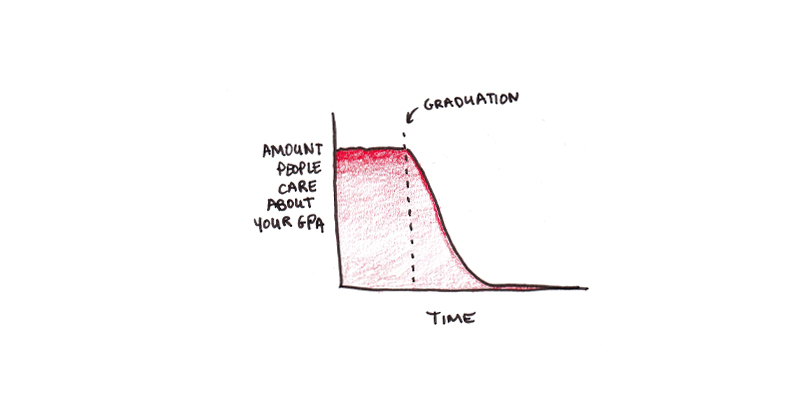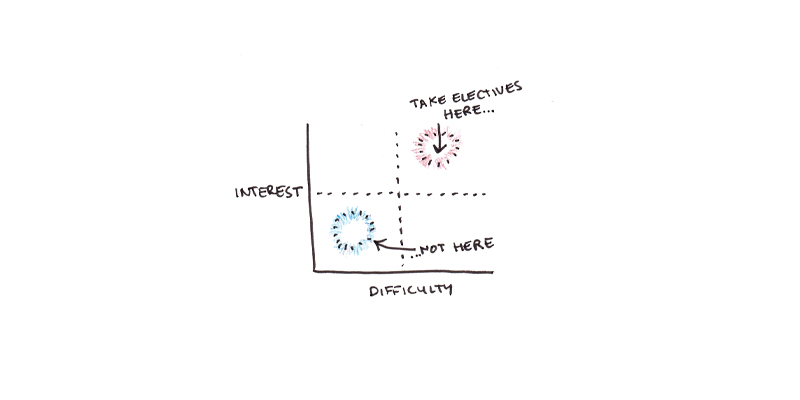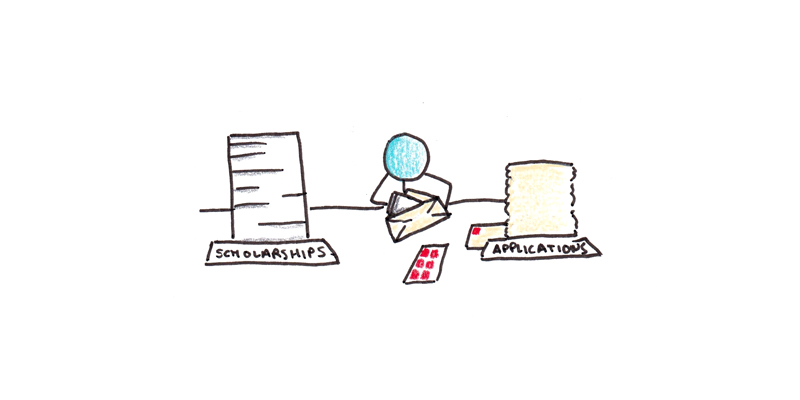We live in a bizarre culture. We expect teenagers to commit to a field of study that will often shape their entire future career. And we ask them to choose their path based on whether they liked their freshman class in that subject.
This is absurd. Work is utterly unlike an intro class. Liking your psychology class doesn’t necessarily mean you should be a therapist or that there will be a job for you once you graduate.
Much of the advice we give to new college students is terrible. Here is some advice I wish I had known when I first went to university.
1. Apply Everywhere, Even “Out of Reach” Schools

Many students, particularly those from disadvantaged backgrounds, don’t get into prestigious schools. This isn’t because they lack the ability, but because they don’t apply. Two myths seem to perpetuate this: first, top schools are too expensive, and second, the chances of getting into a top school are too low to make it worthwhile.
The truth is many elite institutions have generous financial aid packages, so only the children of the richest pay the sticker price. Thus “I can’t afford Harvard/MIT/Stanford” is often false.1
Second, the odds of getting into an elite school aren’t as dismal as they seem. As I reviewed here, the bare odds of getting into Harvard are about one in twenty. That may not seem great, but the reward-to-effort ratio for applying is still pretty good.
This advice will probably strike some as obvious. Yet, I think there’s a stark division here. Some belong to a rankings-obsessed social-climbing class that will do anything to get their kids into a better school. In contrast, others are blissfully unaware that the other half are paying so much attention to what school you went to.
My advice is to split the middle. I don’t think sacrificing yourself in high school is worth it to slightly improve your odds of going to a top school. But, I also think people outside of the rankings-obsessed strata of society would benefit from applying a bit more broadly.
2. Don’t Choose Your Major Because You Like the Classes

Classes are a terrible proxy for whether you’ll enjoy the work. This is especially true at the freshman level, where generic classes are often taught in big auditorium sessions. Psychology 101 is nothing like clinical therapy, research psychology, or, more likely, working at an office doing something unrelated to psychology.
What’s more, you can always learn things outside of school. Since I graduated, I’ve taken dozens of classes online in a range of subjects. I don’t need the pressure of deciding whether I want to do it for my entire life to enjoy the class.
If you arrive at college with a strong intuition of what you want to do with your life, by all means, major in that. But if you’re like most students and have no idea, then deciding your major based on which classes were coolest is a terrible idea.
3. Seriously Consider Majors that Pay Well

The worst advice we give students is to ignore how much money specific fields tend to make. After all, making money is a grubby business, so we tell kids to pick fields of study based on intellectual affinity, academic curiosity and following your passion.
This is bad advice for a few reasons. The first is simply that most college students live in “student poverty,” a strange pseudo-communism where everybody is broke. Thus, one’s choice of major functions like your taste in music or clothes: a way of showing off your personality. This tends to mask the stark differences between the economic prospects for an actuary versus an art history student.
The second reason is that when you’re young and broke, there’s a certain romanticism to it. I remember feeling like money didn’t matter much when I was in my early twenties. Everything I wanted to do was pretty cheap, and none of my friends were rich. But eating ramen noodles and bicycling through the rain to avoid splurging on bus fare gets old in your thirties. If you decide you want to have kids, own a house, or live in a trendy city, you can’t ignore the financial aspects of those decisions.
In my senior year of business school, we were shown the typical starting salaries for graduates with different specializations (accounting, finance, marketing, etc.). It was stunning how much of a range there was, even right out of school. To this day, I have no idea why this information wasn’t at least presented to students when they were freshmen. Still, I think the onus is upon every new student to at least seek this information out.
Sorting majors by median salary and picking the highest one you find interesting enough to get through four years of is perhaps extreme—but only a bit.
4. Enjoy College to the Fullest (Don’t Be a Grind)

You can get good grades without exhausting yourself. Knowing how to study effectively is critical, which is why I wrote about it so extensively when I was in school.
But one thing no one tells students is that soon after graduation, nobody cares about grades. In technical fields or academia, grades may help you land a particular first job or graduate position. But beyond this, it’s incredible how little people pay attention whether you were a C or A+ student.
My advice, then, is tailored for someone who was like myself at eighteen: bright, conscientious, and perhaps a little too worried about maintaining near-perfect grades throughout college.
If you are such a student, my advice is to relax just a little. Take advantage of the many once-in-a-lifetime opportunities college provides. Live in a dorm. Go on exchange. Take weird/hard classes for your electives instead some gimme class that doesn’t force you to learn anything interesting.
On the other hand, if studying is hard for you, I advise setting boundaries and optimizing within them. Efficient, constrained studying nearly always beats the anxiety-driven burnout approach some students take.
5. Take the Hardest Classes You Can Survive

This advice may seem to contradict what I just wrote, but many grinds deliberately choose easy-A classes to maintain a perfect GPA.
The first reason to take challenging classes is that difficulty tends to correlate well with the advice to take economic prospects seriously. While there are exceptions, harder majors tend to pay better.
Secondly, getting into the habit of taking on more demanding challenges than required is a good habit for life outside of college. This is especially true if the stakes are low and you can get by with a C+. It’s better to be the person who takes on challenges slightly above her level and does okay than to be the person who always sticks with the sure thing every time.
6. Apply for Every Scholarship/Fellowship/Grant/Bursary You Can

Sadly, university is becoming increasingly unaffordable. The best way to mitigate that is to get as much financial assistance possible that doesn’t require crushing debt. Scholarships and bursaries may not cover everything, but they can reduce the burden a lot.
Just as many students are too intimidated to apply to the best schools, many don’t apply for scholarships because they think scholarships are reserved for rare geniuses.
My friend Ramit got over one hundred thousand dollars in scholarships to attend Stanford simply by being much more aggressive and systematic in applying than most would. Many scholarships have modest effort barriers (written essays, long forms to fill out) that result in far fewer applicants. Yet, for many students, filling them all out can be worth a lot more than trying to work a minimum wage job to offset your tuition.
7. If You Can, Go On Exchange

Going on exchange isn’t possible for everyone. It’s expensive and not all programs offer one.
But, if you can pull it off, studying abroad is worth it. I could talk about all the ways that living in a different country broadens your intellectual horizons or something high-minded like that, but the main reason is that living in another country is cool.
If you can’t study abroad, spending a year after graduation teaching English as a foreign language is a decent alternative.
Years later, when you have only hazy memories of exams and term papers, your future self will thank you for doing something interesting.
What college advice do you wish you heard when you were 18? Share your thoughts in the comments.


 I'm a Wall Street Journal bestselling author, podcast host, computer programmer and an avid reader. Since 2006, I've published weekly essays on this website to help people like you learn and think better. My work has been featured in The New York Times, BBC, TEDx, Pocket, Business Insider and more. I don't promise I have all the answers, just a place to start.
I'm a Wall Street Journal bestselling author, podcast host, computer programmer and an avid reader. Since 2006, I've published weekly essays on this website to help people like you learn and think better. My work has been featured in The New York Times, BBC, TEDx, Pocket, Business Insider and more. I don't promise I have all the answers, just a place to start.